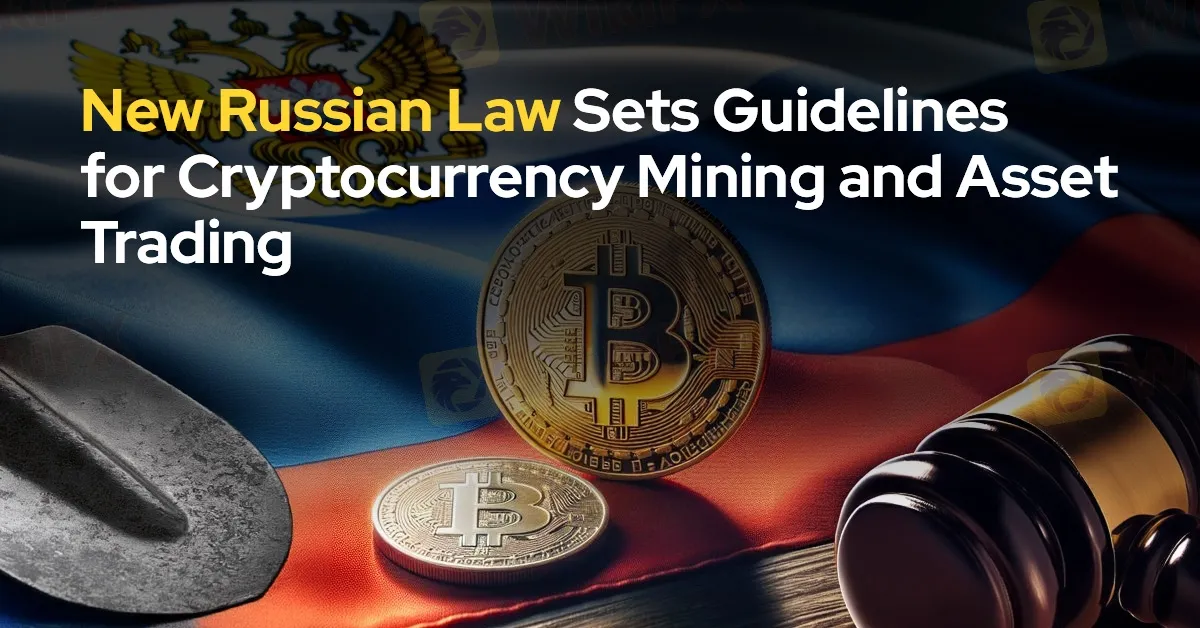简体中文
繁體中文
English
Pусский
日本語
ภาษาไทย
Tiếng Việt
Bahasa Indonesia
Español
हिन्दी
Filippiiniläinen
Français
Deutsch
Português
Türkçe
한국어
العربية
New Russian Law Sets Guidelines for Cryptocurrency Mining and Asset Trading
Abstract:Russia has taken a significant step in its approach to digital assets by officially legalizing cryptocurrency mining. The new legislation, signed into law by President Vladimir Putin, establishes a detailed legal framework for regulating cryptocurrency mining and outlines the rights and responsibilities of those involved in the sector.

Russia has taken a significant step in its approach to digital assets by officially legalizing cryptocurrency mining. The new legislation, signed into law by President Vladimir Putin, establishes a detailed legal framework for regulating cryptocurrency mining and outlines the rights and responsibilities of those involved in the sector.
Published on Russias official legal information portal, this new law brings clarity to the previously unregulated realm of cryptocurrency mining. By officially recognizing mining as a legitimate economic activity, the Russian government integrates it into the broader economic framework, rather than treating it merely as a tool for issuing digital currency.

The legislation stipulates that only Russian legal entities and registered individual entrepreneurs can legally engage in cryptocurrency mining. However, individual miners can operate without registration as long as their energy consumption remains within government-set limits. This provision allows smaller-scale miners to continue their activities with fewer formalities, while larger operations will face more stringent regulations.
In addition to legalizing mining, the law permits the trading of foreign digital financial assets on Russian blockchain platforms. Nonetheless, the Bank of Russia retains the authority to ban certain assets if they are considered a threat to the countrys financial stability. This cautious approach reflects the government's attempt to balance fostering innovation with safeguarding the financial system.
The legislation also imposes strict rules on cryptocurrency advertising and promotion. It bans the offering of digital assets to an unrestricted audience, aiming to curb the widespread promotion of potentially risky investments.
Furthermore, the law provides for the possibility of banning cryptocurrency mining in certain regions or territories, giving the government the flexibility to regulate the industry according to local conditions.
President Putin has underscored the significance of regulating cryptocurrencies and digital assets as a key area for economic growth. In a recent government meeting, he emphasized the need for Russia to capitalize on this opportunity and create a strong legal framework to support the development of digital assets both domestically and in international trade.

Disclaimer:
The views in this article only represent the author's personal views, and do not constitute investment advice on this platform. This platform does not guarantee the accuracy, completeness and timeliness of the information in the article, and will not be liable for any loss caused by the use of or reliance on the information in the article.
Read more

BaFin Halts USDe Token Issuance, Citing Serious Compliance Failures
The German regulator BaFin has frozen USDe token issuance amid compliance issues. What led to this drastic move, and how does it impact the market?

Singapore Police Crack Down on Scams: $1.9M Seized, 25 Arrested
Singapore Police arrested 25 people, froze 300 bank accounts, and seized $1.9 million in an islandwide operation targeting government, investment, and job scams.

SILEGX Investment Scam Unravels: Millions Lost in Crypto Fraud
Authorities in Malaysia have launched investigations into the SILEGX investment scam, which has resulted in financial losses amounting to RM41.5 million. A total of 46 investigation papers have been opened, with victims spanning a range of professions, including retirees, businessmen, teachers, engineers, and a doctor.

FX vs Crypto Trading: Which Strategy is Best for You in 2025?
As financial markets develop, traders in 2025 will confront an exciting yet frightening decision: FX or cryptocurrency trading. Both provide distinct possibilities to benefit from market fluctuations, but they appeal to various risk tolerances, skill levels, and ambitions.
WikiFX Broker
Latest News
Forex Market Outlook: Key Currency Pairs and Trading Strategies for March 24–28, 2025
Singapore Police Crack Down on Scams: $1.9M Seized, 25 Arrested
Gold Prices Swing Near Record Highs
XTB Opens New Dubai Office
Africa Cybercrime Bust: Over 300 Arrested in Fraud Crackdown
The Growing Threat of Fake Emails and Phishing Scams
Hong Kong Banks and Authorities Collaborate to Freeze Fraudulent Accounts Faster
SocialFi and the Forex Market: A New Era for Decentralized Social Trading?
Is Billion Bucks Fx Scam?
BaFin Halts USDe Token Issuance, Citing Serious Compliance Failures
Currency Calculator







